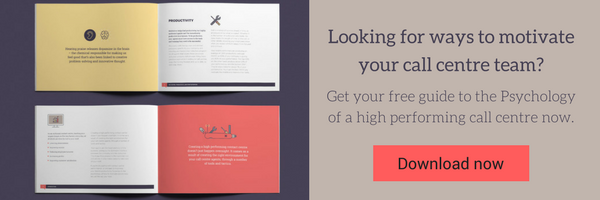Inbound Call Centre Agents and Difficult Conversations

Inbound Call Centre Agents and Difficult Conversations
Are you looking for ways to improve motivation for your team? You know it can be a hard slog working as an inbound call centre agent, you may have done the hard yards yourself. When your job is to talk to customers all day, you’re going to face all sorts of characters and situations. The reality is, not of all these will be happy encounters where you make a connection, have a nice chat and resolve the issue peacefully and quickly. Being a human in the world and a manager of a call centre means you have a pretty good understanding that there are maaaaany different personality types, ones you gel with and ones you have no hope of connecting with, and your agents will speak to both kinds in your inbound call centre.
So how do you help your team stay happy and motivated, by dealing effectively with the challenging people of the world? Or, the perfectly nice people who have had a gutful of their issue not being resolved and are ready to fight from the moment they get on the phone? There are ways, and they don’t all involve ‘being the bigger person’, ‘not taking it personally’ or ‘empathising’. You can include these in your pep talk to your agents, but that kind of thinking and maturity comes with experience. Chances are your team won’t be able to do those things when their heart is pounding while they receive an earful from a stranger they’ve never done anything to, at least not straight off the bat. Here are some tips to keeping your team focused, positive and equipped to handle these tricky situations:
Tell your inbound call centre agents to look into the customer’s history
Prepare your agents for every call by having the right system in place that makes accessing every customer’s history a quick and easy exercise. Once they’ve spoken to them briefly and verified their identity, they should ask for a moment to read their history. This will make the customer feel a little better straight away- having to explain your issue again, when you’ve explained it countless times before, is pretty annoying.
Once they have an idea of the situation, your agents should be sympathetic, letting customers know how they understand how frustrating it must be. This helps to demonstrate that they are dealing with someone who has taken the time to understand their issue and validate their feelings about it.
Breathe
Whether you’re a manager, an agent or just someone sitting in traffic, we get frustrated and stressed. It happens a lot. When we’re feeling agitated and defensive which is what happens while having one’s ear blasted off by an unhappy camper, our heart rate increases and it becomes difficult to think clearly. But this is a natural human response- essentially your body is honing it’s focus on preparing you to fight the tiger that represents an imminent threat. The idea is to slow the heart, which will clear your mind and allow you to listen and respond thoughtfully.
As the manager, you certainly don’t want your team to be abusing this, but they have a hold button- and they should use it. I’m not talking about leaving the customer on hold for a long time, we’re not trying to poke the tiger. If things are getting tense and they feel themselves getting worked up, tell them to ask politely if you they put them on hold so you they look into their history. Close their eyes. Take 10 deep breaths through their nose. Exhale for longer than they inhale. Then hop back on that phone. They might get some strange looks, but if you incorporate this into your training then everyone should know exactly what is going on and that they haven’t gone all hippie zen on them, meditating in the middle of your call centre.
Take Immediate Action
Emphasise to your team the importance of taking action- quickly. When you work in an inbound call centre and have an unhappy customer on your hands, the last thing they want to do is tell them they’ll get back to them. The trust the customer has in your company and the ability to resolve their issue and honour your promises has been badly damaged at this point. Time may be needed to look into the problem, where they trouble shoot, touch base with you, so they have no option but to call them back. But give them the authority to offer them something while they’re on the phone to make things a little better. A 5% discount on their next bill might go a long way. A little peace offering will at least buy them the time to prepare a proper response for the customer.
Follow up
Follow up. Follow up. Follow up. Your agents should never leave the issue for the next agent to resolve- they don’t want to be that guy. Follow through, even if every fibre of their being is telling them that this person has been so rude they don’t deserve a moment more of their attention. Dig deep- this is what you pay them for. They are the voice of the company and you need them to deliver the customer a resolution. They should keep meticulous notes about the conversation and their actions so it is very clear how they’ve handled it, if, god forbid, the customer has to call back. Appeasing a very upset person is a challenge, and the more they do it, the better they get at it. And it’s quite a feather in their cap to successfully navigated a tricky situation like this. So give them a little high five when they work through a situation like this, and think about talking through the situation with the broader team.
For an inbound call centre manager, you know that one of the worst aspects of your team’s job is dealing with cranky customers. The good news is, the more they do it, the better they’ll get at it, and conflict resolution is one of those skills that will benefit you and them throughout your entire lives. They’re just getting a crash course in it as an inbound call centre agent.
Having a happy, motivated, high-performing team means not having your agents in tears when they speak to an upset customer. It means your agents have the training and freedom to solve these challenging situations, without having to rely completely on you as their manager. Finally, it means having the right system in place to give your guys the information they need to really understand the issue and get it sorted. When you work in Customer Service you’re getting schooled in life, and if you have the right tools in place and the right strategies to cope with the difficult times, then productivity follows.
Flickr cc:Hazard-Brick

